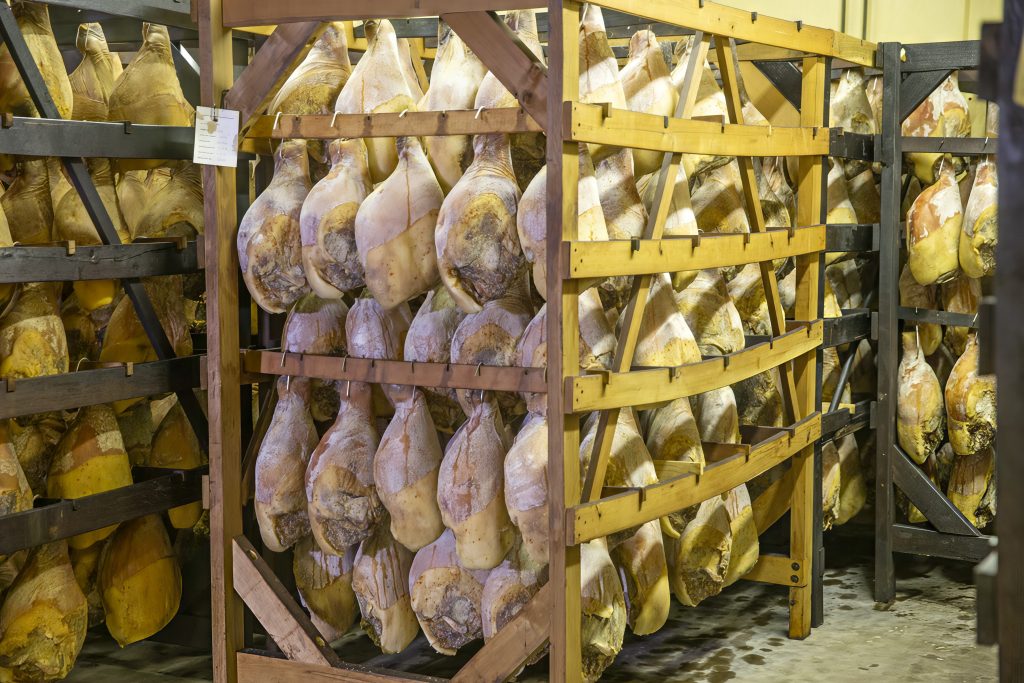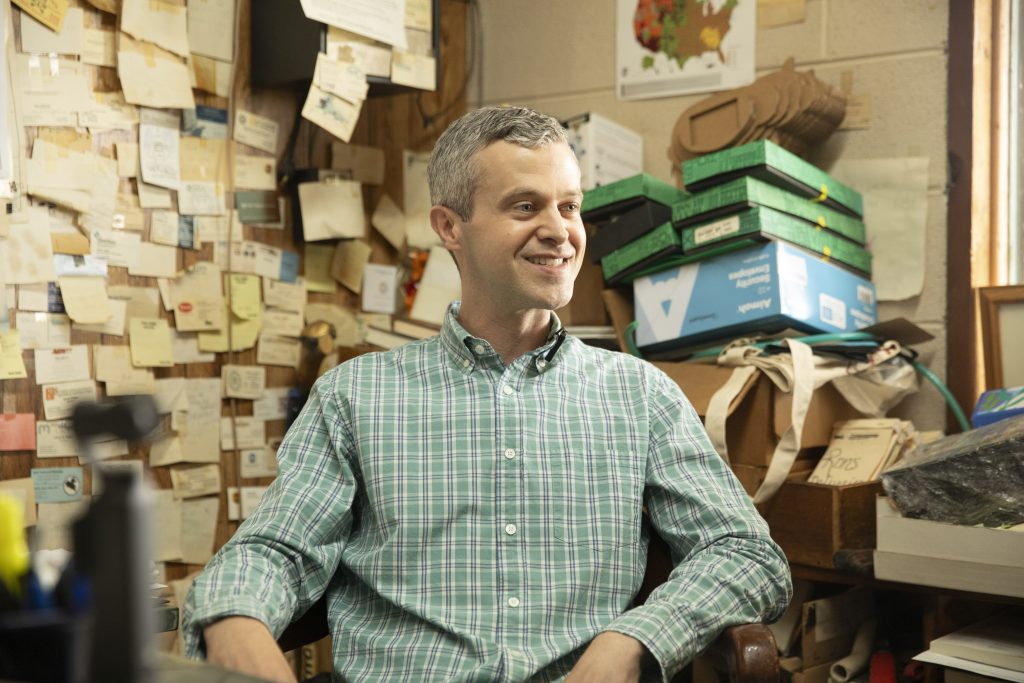A father, a son, and the slow-cured magic behind Benton’s Smoky Mountain Country Hams
If you’ve ever been in a kitchen when a thick-cut strip of Benton’s bacon hits the skillet, you know the sound. You know the smell. And if you’ve tasted it, you know that this is no ordinary pork product. In Madisonville, Tennessee, tucked between rolling hills and smoky hardwood forests, Allan Benton and his son Darrell are quietly making some of the finest cured meats in America—still by hand, still with patience, and still without any fancy marketing machine. Their secret? There is none. Just salt, smoke, and time. And a little bit of family.
I am a frequent visitor to Benton’s. The smell of the smoke of nearly a half dozen decades easily seeps into your bones. And once it’s there, well, you’re hooked—for life. Nothing sets off a charcuterie board better than a hoof on prosciutto style ham on a cutting rack surrounded by an assortment of cheeses and crackers. And if you are a country ham lover, then I suggest lightly frying it, but maybe leave a few pieces in till they are really dark and then deglaze the pan with a little black coffee for the perfect red-eye gravy. A fresh biscuit, some ham, a slice of tomato, and red-eye to dip in? You can call that heaven on a plate. I could go on and on, but let’s get to the story.

A Legacy Begins
“I’d been working as a high school guidance counselor just three or four miles down the road from here,” Allan Benton begins, settling into a wooden chair inside the modest office at Benton’s Smoky Mountain Country Hams. “I’d just gotten my master’s, school started, and they passed out the salary schedule—and within 15 minutes I was in the principal’s office resigning. I knew I couldn’t ever work for what they were going to pay me.”
It was 1973, and Allan walked away from teaching. A few weeks later, he heard that a man named Albert Hicks had shut down a small USDA-inspected curing facility in his backyard. Allan talked Hicks into leasing him the space.
“My family always butchered their own hogs, cured their own meat, made their own sausage,” he says. “I meant to only do it long enough to figure out what I wanted to do. I thought I might want to go to law school. But after about three or four months, I figured out that I was really enjoying what I was doing.”
With a workforce of one, Allan eventually got help from a local man named Arthur Atkins. “He had a sixth-grade education, but I suspect he probably had a 150 IQ. He was incredible, an old country boy with common sense and the memory like an elephant.”
Slowly, Allan built a reputation, peddling hams from the back of his pickup through East Tennessee. The Benton name was fast becoming a staple in Southern kitchens.
A Lucky Break—And Then Some
For years, Allan worked seven days a week, often until midnight. It was in those early years that he met his future bride, Sharon. They married about a year after he started the company. “She should have known better,” Allan chuckles.
The company kept growing, mostly through word-of-mouth but in a stroke of serendipity it catapulted into national view. Benton’s was getting coverage, but there was one food writer of note. “He rented a car in Chattanooga at the airport, and they told him, ‘If you’re looking for country ham, you need to go up to Madisonville.’ He got something to eat in Cleveland, Tennessee, and asked ‘Where can
I find great country ham?’ They told him, ‘You gotta go up to Madisonville,’” Allan recalls. “He came by and visited with us and I didn’t know who he was or anything about it until after the fact.” He’d later learn that the man wrote for
a connoisseur magazine.
That mention, alongside steady exposure from chefs at Blackberry Farm and later the national culinary press, helped catapult Benton’s products onto the menus of elite restaurants from New York to Charleston to Los Angeles. He never advertised—never needed to.

From X-Rays to Country Hams
Despite Allan’s growing reputation, his son Darrell had no interest in joining the family business—at least, not at first. “My earliest memory was when I was four or five,” Darrell says, sitting next to his father, a grin on his face.
“I was in the ham curing cooler, and I remember standing on a milk crate over the salt box and dad teaching me how to rub a country ham, how to cure it.” Darrell snuck down to the shop from their house on the hill any chance he got. “By the time I was seven or eight, I was tall enough where I could label country ham and bacon on the tables back there. At the time, dad only had one or two employees, so it was an all hands on deck situation.”
But as the son of a small business owner, he saw the struggle of his father’s life and when he got out of school, he wanted to do anything but cure country ham and bacon. “I’d about had my fill at that point, so I went looking for greener pastures. I felt called into the medical field.”
Darrell studied at East Tennessee State and trained as a radiologist, eventually practicing in Knoxville. But the farther he moved into medicine, the more he missed what he’d tried to leave behind. “As far back as residency, I remember having thoughts of missing the sights, the smells, and most of all the people in this business,” he says. “A large part of my day as a radiologist was sitting in a small, dark room reading medical imaging, and I missed that connection with people.”
The decision wasn’t easy—but eventually, Darrell walked away from medicine. He told his practice it was time and made the call to his dad. “We’d have some conversations about it, but I don’t know if he really knew how serious I was when I told him I’d already pulled the plug and was going to be heading out here in a few months. He about fell over. He said, ‘Son…what have you done?’” Darrell laughs. Allan shakes his head: “All I wanted was for him to be happy. And it was obvious—he was.”
A New Generation, The Same Cure
Today, the two work side by side—Allan bringing wisdom from five decades in the smokehouse, and Darrell adding just enough technology to keep up with a world of online orders, food blogs, and Instagram chefs. He had added
a website when he was still in college.
Allan remembers when the site went live and the call that came from Darrell. “He said, ‘Dad, you need to check it. You’ve got seven orders.” He thought he was joking. Today, Benton’s ships nationwide. During the holidays, orders pile up by the hundreds, many destined for Michelin-starred kitchens and white-tablecloth establishments. But of course, a steady local customer base remains.
Simple, Time-Honored and Deeply Southern
Ask either of these men what makes Benton’s special, and you’ll get the same answer: “There’s no secret.”
“Salt, brown sugar, pepper,” Allan says. They still cure hams for up to two years and smoke their bacon over hickory for days. “Not many people are willing to take the time to make a two-year ham,” he says. But they do. He’s also quick to note their bacon contains no nitrates. “I’ve made it now for 52 years with no nitrite or nitrates.”
What about the ham? Technically, it can’t be called prosciutto—wrong continent—but it’s darn close to it.
“We’re planning to go to Europe, Spain and Italy,” Allan says. “We need to see what our European cousins are doing over there. You always learn something.”

Time-Honored Memories
The office smells faintly of smoke and old paper. There’s a church pew in the entryway where old-timers still sit and swap stories. And over in the corner, Darrell points to where his grandfather used to cook lunch on an electric skillet. “He made the best fried chicken,” Darrell says. “That’s
a really warm memory.” And the worst memories? “During our busiest times, we’d often stay out here either packing bacon or shipping orders until 11 or 12 o’clock at night,” Darrell laughs. “You know, it’s tough to see the light at the end of the tunnel when you’re 10 or 12 years old, but I think that hard work is good for you.”
These days, he brings his own children—William, 10, and Emily, 8—around the shop. “They don’t have cell phones yet,” he says. “They want to spend time down here.”
What Comes Next
Darrell isn’t looking to reinvent the wheel. After all, to take a company into its next chapter, you need the right formula—and the formula at Benton’s works. But with some small changes and a renewed sense of purpose, no doubt the next chapter will be something exceptional.
“We might experiment with some different types of charcuterie on
a small scale, but this place has run pretty well for 52 years now,” Darrell says. “We’re going to keep on keeping on and stick to tradition.”
As for the pressure that might come with taking the helm of a company built on the back of a legend, Darrell shakes his head. It turns out that it’s not something he feels in the slightest.
“I’m proud of him, proud of what he’s done and what he’s built. And most of all, I’m proud of how he treats people,” Darrell says. “He’s built this business one relationship at a time.”
Oh, and about the bacon: “Best way to eat it?” Darell and Allan both say in unison. “BLT. Garden tomato. Cheap white bread. Little Duke’s or JFG mayonnaise.”
Sometimes the simplest things are the best. Just ask anyone who’s tasted a slice of Benton’s bacon.

Comments are closed.